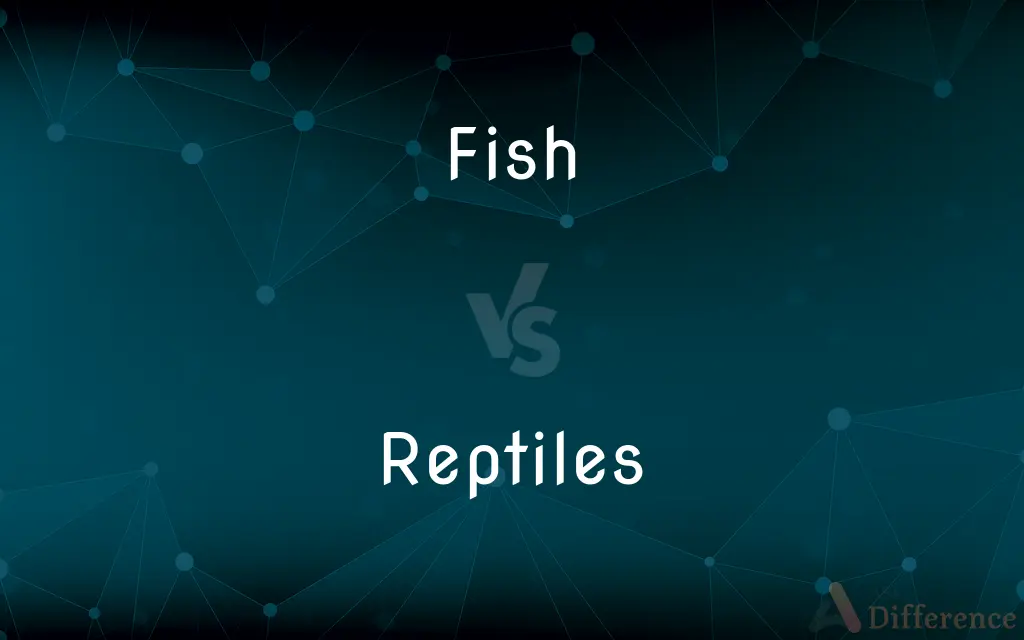Fish vs. Reptiles — What's the Difference?
By Tayyaba Rehman — Published on November 4, 2023
Fish are aquatic, gilled vertebrates; Reptiles are cold-blooded, scaly-skinned vertebrates primarily living on land.

Difference Between Fish and Reptiles
Table of Contents
ADVERTISEMENT
Key Differences
Fish are cold-blooded animals that live exclusively in water. They breathe through gills and typically have fins and scales. Reptiles, however, are a diverse group of animals that primarily live on land and breathe air through lungs.
Most species of fish are ectothermic (cold-blooded) and rely on their environment to regulate body temperature. Reptiles are also ectothermic, but they often bask in the sun or find shade to regulate their temperature.
The skeletal structure of fish is adapted for an aquatic lifestyle, often featuring streamlined bodies for efficient swimming. In contrast, reptiles have skeletons adapted for crawling, climbing, or even swimming in some species.
Fish generally reproduce by laying eggs in water, which are often externally fertilized. Reptiles lay hard or leathery eggs on land, or some even give birth to live young.
While fish have a single loop circulatory system with a two-chambered heart, reptiles have a double-loop circulatory system with a three or four-chambered heart.
ADVERTISEMENT
Comparison Chart
Habitat
Aquatic
Primarily terrestrial
Skin
Scales; slimy
Scales; dry
Respiration
Gills
Lungs
Reproduction
Mostly external fertilization in water
Internal fertilization, lay eggs on land
Circulatory System
Single loop, two-chambered heart
Double loop, three or four-chambered heart
Compare with Definitions
Fish
Cold-blooded vertebrates with fins and scales.
Children enjoy watching colorful fish in aquariums.
Reptiles
Vertebrates that lay hard or leathery eggs on land.
Most reptiles reproduce by laying eggs in safe environments.
Fish
Any of numerous cold-blooded aquatic vertebrates characteristically having fins, gills, and a streamlined body and including the bony fishes, such as catfishes and tunas, and the cartilaginous fishes, such as sharks and rays.
Reptiles
Cold-blooded animals with scaly skin.
Snakes and lizards are common types of reptiles.
Fish
Any of various jawless aquatic craniates, including the lampreys and hagfishes.
Reptiles
Creatures primarily adapted to terrestrial habitats.
Unlike fish, reptiles are better adapted to life on land.
Fish
The flesh of such animals used as food.
Reptiles
Members of the class Reptilia in the animal kingdom.
Studying the evolutionary history of reptiles offers insights into Earth's past ecosystems.
Fish
(Informal) A person, especially one considered deficient in something
A poor fish.
Reptiles
Animals that include snakes, lizards, crocodiles, and turtles.
Some reptiles, like certain turtles, have a long lifespan.
Fish
To catch or try to catch fish.
Reptiles
Any of various usually cold-blooded egg-laying vertebrates often grouped in the class Reptilia, having dry skin covered with scales or horny plates and breathing by means of lungs, and including the snakes, lizards, crocodilians, and turtles. In some classification systems, birds are considered to be reptiles because they are descended from reptilian dinosaurs.
Fish
To look for something by feeling one's way; grope
Fished in both pockets for a coin.
Reptiles
A person regarded as contemptible or obsequious.
Fish
To seek something in a sly or indirect way
Fish for compliments.
Reptiles
Plural of reptile
Fish
To catch or try to catch (fish).
Fish
To catch or try to catch fish in
Fish mountain streams.
Fish
To catch or pull as if fishing
Deftly fished the corn out of the boiling water.
Fish
(countable) A cold-blooded vertebrate animal that lives in water, moving with the help of fins and breathing with gills.
Salmon is a fish.
The fishmonger sells fishes from all over the world.
Ichthyologists study the fish of the world.
We have many fish in our aquarium.
Fish
Any animal (or any vertebrate) that lives exclusively in water.
Fish
(Newfoundland) Cod; codfish.
Fish
(uncountable) The flesh of the fish used as food.
The seafood pasta had lots of fish but not enough pasta.
Though Lena is a vegetarian, she doesn't have any problem with eating fish.
Fish
(uncountable) A card game in which the object is to obtain cards in pairs or sets of four (depending on the variation), by asking the other players for cards of a particular rank.
Fish
A woman.
Fish
An easy victim for swindling.
Fish
A bad poker player. Compare shark (a good poker player).
Fish
A makeshift overlapping longitudinal brace, originally shaped roughly like a fish, used to temporarily repair or extend a spar or mast of a ship.
Fish
(nautical) A purchase used to fish the anchor.
Fish
A torpedo self-propelled explosive device.
Fish
(zoology) A paraphyletic grouping of the following extant taxonomic groups:
Fish
Class Myxini, the hagfish (no vertebrae)
Fish
Class Petromyzontida, the lampreys (no jaw)
Fish
Within infraphylum Gnathostomata (jawed vertebrates (also including Tetrapoda))
Fish
(cartomancy) The thirty-fourth Lenormand card.
Fish
(prison slang) A new (usually vulnerable) prisoner.
Fish
A male homosexual; a gay man.
Fish
A period of time spent fishing.
The fish at the lake didn't prove successful.
Fish
An instance of seeking something.
Merely two fishes for information told the whole story.
Fish
(obsolete) A counter, used in various games.
Fish
(intransitive) To hunt fish or other aquatic animals in a body of water.
We went fishing for crabs by the pier.
She went to the river to fish for trout.
Fish
(transitive) To search (a body of water) for something other than fish.
They fished the surrounding lakes for the dead body.
Fish
To use as bait when fishing.
Fish
(intransitive) To (attempt to) find or get hold of an object by searching among other objects.
Why are you fishing through my things?
He was fishing for the keys in his pocket.
Fish
To talk to people in an attempt to get them to say something, or seek to obtain something by artifice.
The detective visited the local pubs fishing around for more information.
The actors loitered at the door, fishing for compliments.
Fish
Of a batsman, to attempt to hit a ball outside off stump and miss it.
Fish
To repair (a spar or mast) by fastening a beam or other long object (often called a fish) over the damaged part (see Noun above).
Fish
To hoist the flukes of.
Fish
A counter, used in various games.
Fish
A name loosely applied in popular usage to many animals of diverse characteristics, living in the water.
Fish
An oviparous, vertebrate animal usually having fins and a covering scales or plates. It breathes by means of gills, and lives almost entirely in the water. See Pisces.
Fish
The twelfth sign of the zodiac; Pisces.
Fish
The flesh of fish, used as food.
Fish
A purchase used to fish the anchor.
Fish
To attempt to catch fish; to be employed in taking fish, by any means, as by angling or drawing a net.
Fish
To seek to obtain by artifice, or indirectly to seek to draw forth; as, to fish for compliments.
Any other fishing question.
Fish
To catch; to draw out or up; as, to fish up an anchor.
Fish
To search by raking or sweeping.
Fish
To try with a fishing rod; to catch fish in; as, to fish a stream.
Fish
Any of various mostly cold-blooded aquatic vertebrates usually having scales and breathing through gills;
The shark is a large fish
In the livingroom there was a tank of colorful fish
Fish
The flesh of fish used as food;
In Japan most fish is eaten raw
After the scare about foot-and-mouth disease a lot of people started eating fish instead of meat
They have a chef who specializes in fish
Fish
(astrology) a person who is born while the sun is in Pisces
Fish
The twelfth sign of the zodiac; the sun is in this sign from about February 19 to March 20
Fish
Seek indirectly;
Fish for compliments
Fish
Catch or try to catch fish or shellfish;
I like to go fishing on weekends
Fish
Aquatic animals that breathe using gills.
The salmon is a type of fish known for its migratory patterns.
Fish
A creature that lives and swims in water.
Many fish are caught for food or sport.
Fish
Animals primarily found in freshwater or saltwater habitats.
Some fish, like sharks, are predators in their ecosystems.
Fish
A category in the animal kingdom under the subphylum Vertebrata.
Studying the diversity of fish is fascinating for marine biologists.
Common Curiosities
Do fish live exclusively in water?
Yes, fish are aquatic animals that live exclusively in water.
Do fish have lungs?
Most fish do not have lungs and breathe through gills; however, some fish like lungfish do have lungs.
How do reptiles regulate their body temperature?
Reptiles are ectothermic and regulate their temperature through external means like basking.
Do fish breathe air?
Fish primarily breathe oxygen from water through their gills, but some species can also gulp air.
What's a common trait among reptiles regarding their skin?
Reptiles have dry, scaly skin.
Which reptiles are known for changing colors?
Chameleons, a type of reptile, are well-known for their ability to change colors.
Can reptiles live in both water and on land?
Some reptiles, like crocodiles and certain turtles, are adapted to both aquatic and terrestrial habitats.
Are all reptiles dangerous to humans?
No, while some reptiles can be dangerous, many are harmless.
Can fish live in both saltwater and freshwater?
Some fish are adapted to saltwater, some to freshwater, and some can live in both.
How do fish reproduce?
Most fish reproduce by laying eggs in water, often with external fertilization.
Are all reptiles carnivorous?
No, while many reptiles are carnivores, some are herbivores or omnivores.
Which is older in evolutionary terms, fish or reptiles?
Fish evolved before reptiles, making them older in evolutionary terms.
Do all fish have scales?
While most fish have scales, some, like catfish, do not.
How do reptiles breathe?
Reptiles breathe air using lungs.
What do fish typically eat?
Fish diets vary widely; they can be herbivores, carnivores, omnivores, or detritivores.
Share Your Discovery

Previous Comparison
Olive Oil for Hair vs. Coconut Oil for Hair
Next Comparison
Centre of Gravity vs. CentroidAuthor Spotlight
Written by
Tayyaba RehmanTayyaba Rehman is a distinguished writer, currently serving as a primary contributor to askdifference.com. As a researcher in semantics and etymology, Tayyaba's passion for the complexity of languages and their distinctions has found a perfect home on the platform. Tayyaba delves into the intricacies of language, distinguishing between commonly confused words and phrases, thereby providing clarity for readers worldwide.













































